学生英语能力自评-互评表
- 格式:doc
- 大小:77.00 KB
- 文档页数:3
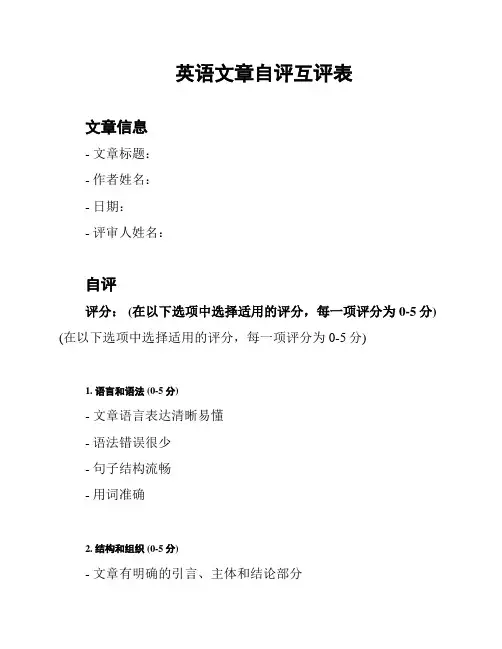
英语文章自评互评表文章信息- 文章标题:- 作者姓名:- 日期:- 评审人姓名:自评评分: (在以下选项中选择适用的评分,每一项评分为0-5分) (在以下选项中选择适用的评分,每一项评分为0-5分)1. 语言和语法 (0-5分)- 文章语言表达清晰易懂- 语法错误很少- 句子结构流畅- 用词准确2. 结构和组织 (0-5分)- 文章有明确的引言、主体和结论部分- 每个段落都有明确的主题句- 段落之间过渡自然3. 内容与观点 (0-5分)- 文章内容准确、全面- 观点清晰明确- 有足够的证据和支持材料4. 描述和解释 (0-5分)- 描述准确生动- 解释清晰易懂- 用例子或论证来支持描述和解释5. 结论 (0-5分)- 结论简洁明确- 呼应引言并总结主要观点- 提供展望或启示6. 文章整体印象 (0-5分)- 文章给人留下深刻印象- 文章读起来有趣- 文章吸引读者继续阅读的兴趣互评评分: (在以下选项中选择适用的评分,每一项评分为0-5分) (在以下选项中选择适用的评分,每一项评分为0-5分)1. 语言和语法 (0-5分)- 文章语言表达清晰易懂- 语法错误很少- 句子结构流畅- 用词准确2. 结构和组织 (0-5分)- 文章有明确的引言、主体和结论部分- 每个段落都有明确的主题句- 段落之间过渡自然3. 内容与观点 (0-5分)- 文章内容准确、全面- 观点清晰明确- 有足够的证据和支持材料4. 描述和解释 (0-5分)- 描述准确生动- 解释清晰易懂- 用例子或论证来支持描述和解释5. 结论 (0-5分)- 结论简洁明确- 呼应引言并总结主要观点- 提供展望或启示6. 文章整体印象 (0-5分)- 文章给人留下深刻印象- 文章读起来有趣- 文章吸引读者继续阅读的兴趣总结请根据以上问题的评分汇总,向作者提出您的建议和改进建议。
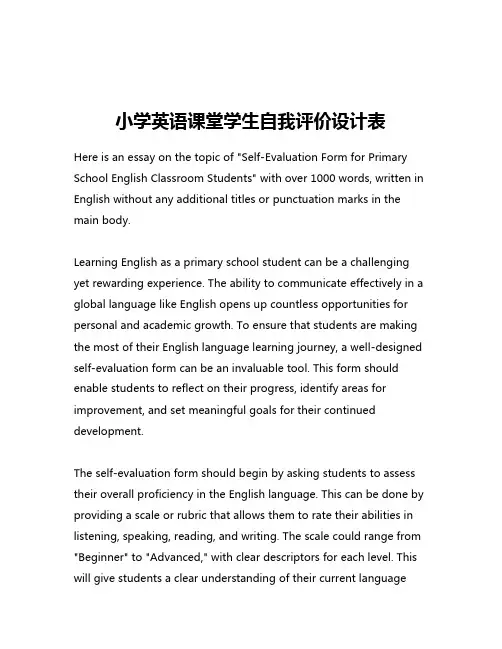
小学英语课堂学生自我评价设计表Here is an essay on the topic of "Self-Evaluation Form for Primary School English Classroom Students" with over 1000 words, written in English without any additional titles or punctuation marks in the main body.Learning English as a primary school student can be a challenging yet rewarding experience. The ability to communicate effectively in a global language like English opens up countless opportunities for personal and academic growth. To ensure that students are making the most of their English language learning journey, a well-designed self-evaluation form can be an invaluable tool. This form should enable students to reflect on their progress, identify areas for improvement, and set meaningful goals for their continued development.The self-evaluation form should begin by asking students to assess their overall proficiency in the English language. This can be done by providing a scale or rubric that allows them to rate their abilities in listening, speaking, reading, and writing. The scale could range from "Beginner" to "Advanced," with clear descriptors for each level. This will give students a clear understanding of their current languageskills and help them track their progress over time.Next, the form should delve into specific language skills and competencies. For listening, students can evaluate their ability to comprehend verbal instructions, follow conversations, and understand the main ideas of audio or video materials. In the speaking section, students can assess their confidence in initiating and maintaining conversations, their pronunciation and intonation, and their ability to express their thoughts and ideas effectively.The reading and writing sections of the self-evaluation form should be equally comprehensive. For reading, students can reflect on their ability to understand the gist of written texts, identify key information, and make inferences. The writing section should ask students to evaluate their skills in areas such as grammar, vocabulary, organization, and the overall clarity and coherence of their written work.In addition to these core language skills, the self-evaluation form should also address other important aspects of language learning, such as cultural awareness and learning strategies. Students can assess their understanding of cultural differences, their ability to adapt their communication style to different contexts, and their use of effective learning strategies, such as seeking feedback, using reference materials, and practicing regularly.To make the self-evaluation form truly impactful, it should also include sections for goal-setting and action planning. Students should be encouraged to identify specific areas they would like to improve and set measurable, achievable, and time-bound goals. They can then outline the steps they will take to reach these goals, such as dedicating more time to practicing, seeking additional help from teachers or tutors, or incorporating new learning resources into their study routine.The self-evaluation form should be designed in a way that is user-friendly and engaging for primary school students. This may involve the use of visual aids, such as illustrations or icons, to make the form more appealing and easier to navigate. Additionally, the language used in the form should be clear, concise, and age-appropriate, ensuring that students can understand and engage with the content.Regular completion of the self-evaluation form can have numerous benefits for primary school students. By taking the time to reflect on their progress and set goals, students will develop a greater sense of ownership and investment in their English language learning. This, in turn, can lead to increased motivation, improved learning outcomes, and a deeper appreciation for the value of the English language.Furthermore, the self-evaluation form can serve as a valuable tool forteachers and parents. By reviewing the completed forms, they can gain insights into the individual needs and strengths of each student, allowing them to provide more targeted support and guidance. This information can also be used to inform curriculum planning and instructional strategies, ensuring that the English language program is responsive to the specific needs of the students.In conclusion, a well-designed self-evaluation form for primary school English classroom students can be a powerful tool for fostering self-awareness, goal-setting, and language learning success. By encouraging students to take an active role in evaluating their progress and charting their own development, this form can help them become more confident, autonomous, and effective learners of the English language.。
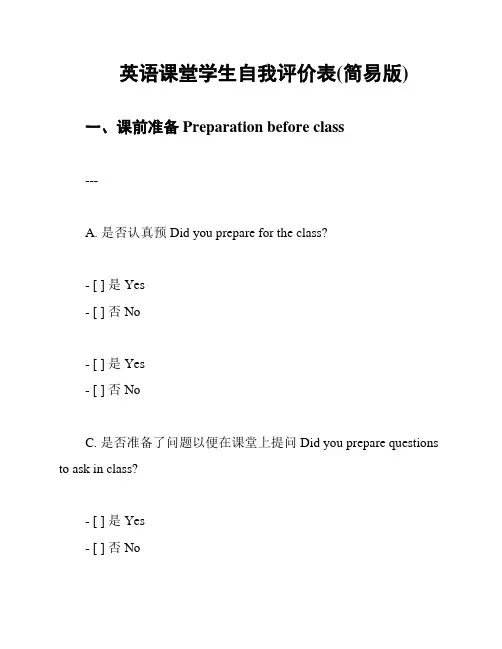
英语课堂学生自我评价表(简易版)一、课前准备 Preparation before class---A. 是否认真预 Did you prepare for the class?- [ ] 是 Yes- [ ] 否 No- [ ] 是 Yes- [ ] 否 NoC. 是否准备了问题以便在课堂上提问 Did you prepare questions to ask in class?- [ ] 是 Yes- [ ] 否 No---二、参与度 Participation---A. 是否积极回答问题 Did you actively participate in answering questions?- [ ] 是 Yes- [ ] 否 No- [ ] 是 Yes- [ ] 否 NoC. 是否与教师保持良好的互动 Did you engage in a positive interaction with the teacher?- [ ] 是 Yes- [ ] 否 No---三、听说读写 Skills in Listening, Speaking, Reading, and Writing---A. 听力 Listening- [ ] 较好 Good- [ ] 一般 Average- [ ] 需改进 Needs improvementB. 口语 Speaking- [ ] 较好 Good- [ ] 一般 Average- [ ] 需改进 Needs improvementC. 阅读 Reading- [ ] 较好 Good- [ ] 一般 Average- [ ] 需改进 Needs improvementD. 写作 Writing- [ ] 较好 Good- [ ] 一般 Average- [ ] 需改进 Needs improvement---四、自我评价 Self-evaluation请在下方简要写下你对自己在本学期的英语研究方面的评价,并提出自己未来进步的目标。
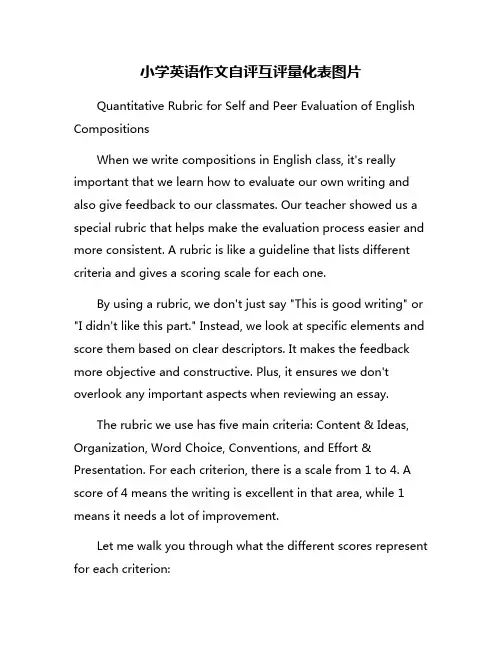
小学英语作文自评互评量化表图片Quantitative Rubric for Self and Peer Evaluation of English CompositionsWhen we write compositions in English class, it's really important that we learn how to evaluate our own writing and also give feedback to our classmates. Our teacher showed us a special rubric that helps make the evaluation process easier and more consistent. A rubric is like a guideline that lists different criteria and gives a scoring scale for each one.By using a rubric, we don't just say "This is good writing" or "I didn't like this part." Instead, we look at specific elements and score them based on clear descriptors. It makes the feedback more objective and constructive. Plus, it ensures we don't overlook any important aspects when reviewing an essay.The rubric we use has five main criteria: Content & Ideas, Organization, Word Choice, Conventions, and Effort & Presentation. For each criterion, there is a scale from 1 to 4. A score of 4 means the writing is excellent in that area, while 1 means it needs a lot of improvement.Let me walk you through what the different scores represent for each criterion:。
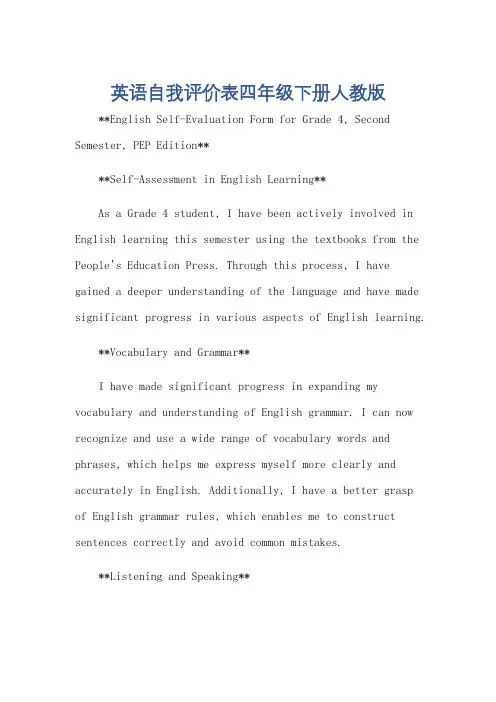
英语自我评价表四年级下册人教版**English Self-Evaluation Form for Grade 4, Second Semester, PEP Edition****Self-Assessment in English Learning**As a Grade 4 student, I have been actively involved in English learning this semester using the textbooks from the People's Education Press. Through this process, I have gained a deeper understanding of the language and have made significant progress in various aspects of English learning. **Vocabulary and Grammar**I have made significant progress in expanding my vocabulary and understanding of English grammar. I can now recognize and use a wide range of vocabulary words and phrases, which helps me express myself more clearly and accurately in English. Additionally, I have a better graspof English grammar rules, which enables me to construct sentences correctly and avoid common mistakes.**Listening and Speaking**In terms of listening and speaking skills, I have improved significantly. I can now understand English conversations and lectures more easily, and I am able to participate actively in class discussions. My pronunciation and fluency in speaking English have also improved, which helps me communicate more confidently with my classmates and teachers.**Reading and Writing**My reading and writing skills have also seensignificant improvement. I can now read and understand English texts more easily, and I am able to write short essays and stories in English. My writing is more structured and coherent, and I can express my ideas more clearly and effectively in English.**Attitude and Motivation**Finally, I would like to highlight my positive attitude and motivation towards English learning. I am always eager to participate in class activities and complete assignments on time. I also enjoy reading English books and watching English movies to improve my language skills. My teachers and parents have noticed my dedication and enthusiasmtowards English learning, and they have praised me for my progress.**中文内容****四年级下册人教版英语自我评价表**---**英语学习自我评价**作为四年级的学生,本学期我积极投入到人教版英语教材的学习中。
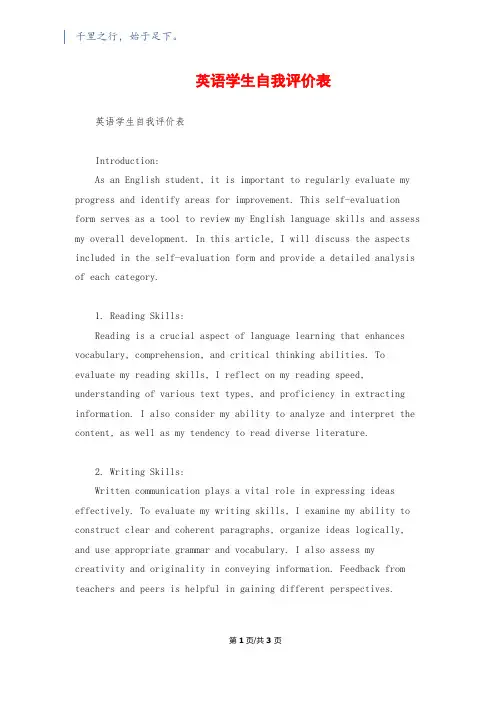
千里之行,始于足下。
英语学生自我评价表英语学生自我评价表Introduction:As an English student, it is important to regularly evaluate my progress and identify areas for improvement. This self-evaluation form serves as a tool to review my English language skills and assess my overall development. In this article, I will discuss the aspects included in the self-evaluation form and provide a detailed analysis of each category.1. Reading Skills:Reading is a crucial aspect of language learning that enhances vocabulary, comprehension, and critical thinking abilities. To evaluate my reading skills, I reflect on my reading speed, understanding of various text types, and proficiency in extracting information. I also consider my ability to analyze and interpret the content, as well as my tendency to read diverse literature.2. Writing Skills:Written communication plays a vital role in expressing ideas effectively. To evaluate my writing skills, I examine my ability to construct clear and coherent paragraphs, organize ideas logically, and use appropriate grammar and vocabulary. I also assess mycreativity and originality in conveying information. Feedback from teachers and peers is helpful in gaining different perspectives.第1页/共3页锲而不舍,金石可镂。
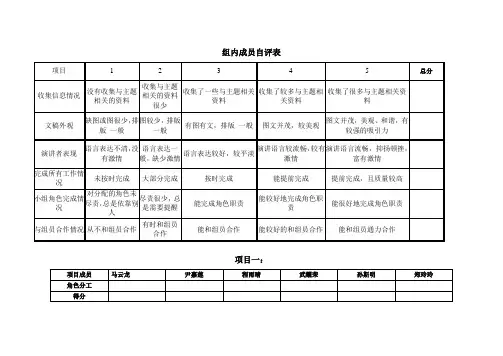
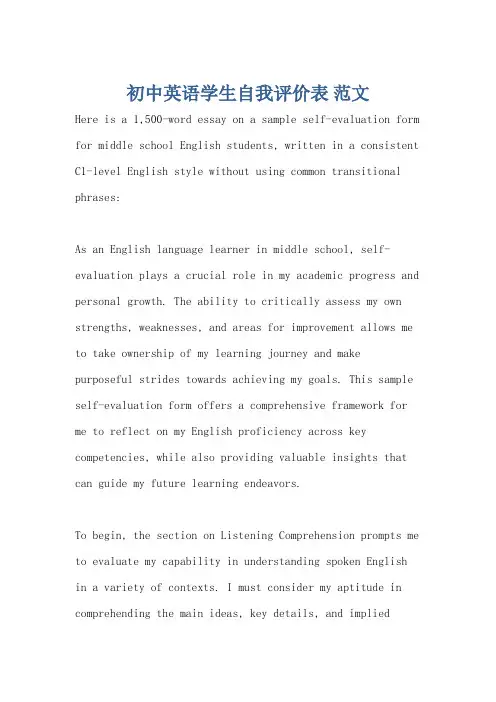
初中英语学生自我评价表范文Here is a 1,500-word essay on a sample self-evaluation form for middle school English students, written in a consistent C1-level English style without using common transitional phrases:As an English language learner in middle school, self-evaluation plays a crucial role in my academic progress and personal growth. The ability to critically assess my own strengths, weaknesses, and areas for improvement allows me to take ownership of my learning journey and make purposeful strides towards achieving my goals. This sample self-evaluation form offers a comprehensive framework for me to reflect on my English proficiency across key competencies, while also providing valuable insights that can guide my future learning endeavors.To begin, the section on Listening Comprehension prompts me to evaluate my capability in understanding spoken Englishin a variety of contexts. I must consider my aptitude in comprehending the main ideas, key details, and impliedmeanings within conversations, presentations, and other audio materials. Do I possess the linguistic agility to follow along with native-level discourse, even when the speech is delivered at a natural pace with occasional idiomatic expressions or regional accents? Can Ieffectively extract relevant information and draw logical conclusions based on what I have heard? These are the types of self-reflective questions I must ponder to gauge my listening skills.Moving on, the Reading Comprehension component urges me to scrutinize my proficiency in understanding written English texts across a range of genres and complexity levels. Do I exhibit the analytical capability to derive meaning from academic articles, literary works, and other informational sources? Can I efficiently identify the central themes, recognize the author's purpose and perspective, and interpret implicit messages embedded within the text? Moreover, I must assess my ability to employ effective reading strategies, such as skimming, scanning, and close reading, to navigate through English materials with ease and clarity.In the Spoken Interaction section, I am prompted to evaluate my competence in engaging in spontaneous, dialogic communication in English. Do I demonstrate the linguistic flexibility to initiate, sustain, and conclude conversations on a wide array of topics, seamlessly adapting my speech to the context and the needs of my interlocutor? Can I effectively express my ideas, opinions, and feelings, while also exhibiting the listening skills to comprehend and respond appropriately to my conversational partner? Additionally, I must consider my nonverbal communication skills, such as eye contact, body language, and tone of voice, which play a crucial role infacilitating smooth, natural exchanges.The Spoken Production component requires me to scrutinize my ability to deliver coherent, fluent, and well-structured oral presentations or monologues in English. Do I possess the linguistic resources and organizational prowess to present information, describe experiences, or defend arguments in a clear and compelling manner? Can I maintain a consistent level of grammatical accuracy and appropriatevocabulary usage throughout my speech, while also demonstrating the capacity to self-correct and reformulate as needed? Furthermore, I must assess my skills inutilizing various rhetorical devices, such as transitions, emphasis, and rhetorical questions, to enhance the overall effectiveness of my spoken performance.In the domain of Writing, I am tasked with evaluating my proficiency in composing cohesive, well-developed, and coherent written texts in English. Do I exhibit the ability to effectively organize my ideas, utilize appropriate linguistic structures, and employ a wide range of vocabulary to convey my message with clarity and precision? Can I adapt my writing style and tone to suit different purposes and target audiences, while also demonstrating the capacity to revise and edit my work to improve its quality? Additionally, I must consider my mastery of fundamental writing mechanics, such as spelling, punctuation, and capitalization, which contribute to the overall polish and readability of my written compositions.The final section of the self-evaluation form focuses onLanguage Awareness, prompting me to assess my understanding of the underlying grammar, syntax, and lexical systems that govern the English language. Do I possess a solid grasp of English grammar rules, including verb tenses, sentence structures, and agreement patterns? Can I accurately identify and correct grammatical errors in both my own and others' writing or speech? Moreover, I must evaluate my ability to expand my English vocabulary, comprehend the nuances of word meanings, and apply appropriate terms in various contexts.As I work through this comprehensive self-evaluation form, I am encouraged to provide detailed, objective, and insightful reflections on my current English language proficiency. By carefully examining my performance across the key competencies, I can gain a deeper understanding of my strengths and weaknesses, allowing me to develop a targeted plan for ongoing improvement and growth.For instance, if I identify Listening Comprehension as an area of strength, I can celebrate this accomplishment and continue to challenge myself by engaging with more complex,authentic audio materials. Conversely, if I recognize Spoken Interaction as a domain in need of further development, I can devise strategies to enhance my conversational skills, such as seeking out opportunities to engage in English dialogues with peers or participating in language exchange programs.The self-evaluation process also encourages me to set realistic, measurable goals for myself, which can serve as a roadmap for my future learning journey. By articulating specific targets, such as achieving a particular score on a standardized English proficiency test or mastering the usage of certain grammatical structures, I can maintain a clear sense of direction and monitor my progress along the way.Moreover, this self-evaluation form prompts me to reflect on my personal learning preferences, motivations, and strategies. Do I thrive in collaborative learning environments, or do I prefer independent study? Am I intrinsically motivated to improve my English skills, or do I require external incentives? What study habits andtechniques have proven effective for me in the past? By delving into these introspective questions, I can tailor my learning approach to better suit my individual needs and preferences, ultimately enhancing the efficiency and effectiveness of my English language acquisition.In conclusion, this comprehensive self-evaluation form serves as a valuable tool for middle school English language learners like myself to critically assess our current proficiency, identify areas for improvement, and chart a course for future growth and success. By engagingin this reflective process, we can take ownership of our learning journey, set meaningful goals, and develop strategies that align with our unique strengths, weaknesses, and learning styles. Through this holistic self-evaluation, we can unlock our full potential as English language learners, empowering ourselves to navigate the linguistic and academic challenges that lie ahead with confidence and determination.。
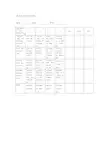
英语作文自评互评表:
班级:姓名:学号:
评论级别
A B C D自评小组评师评参照标准
字体能否字体工整,字体基本字体欠工字体潦草,
工整,拼写拼写正确,工整,有少整,有涂改有多处涂
能否正确,作业整齐许错误,作现象,文中改,好多错
作业能否业基本整有一些错误,字数不
洁净洁误够
语法、词汇应用了较能应用一语法构造文章语法
运用能否多的语法些语法结单一、词汇错误许多,
正确构造和高构和词汇项目有限,词汇很有
级词汇不影响理限,影响理
解解
内容能否重点齐备,重点基本重点基本重点不全,
内容完好,齐备,内容齐备,内容
完好,重点
内容过于
能否齐备看法不明较完好,有较完好,内
确意义容一般简单
文章逻辑有效地使应用简单较少使用语句断短
性能否强,用了语句的语句间语句间的续续,行文
连结能否间的连结的连结成连结成分,不流利,无
成分,使全分,使全文内容缺乏连词过分
紧凑
文构造紧构造紧凑连结性
凑
创建性有创建性,较有创建创意不够,没有创意,
表现力强性,简要,较完好内容不完
完好整。
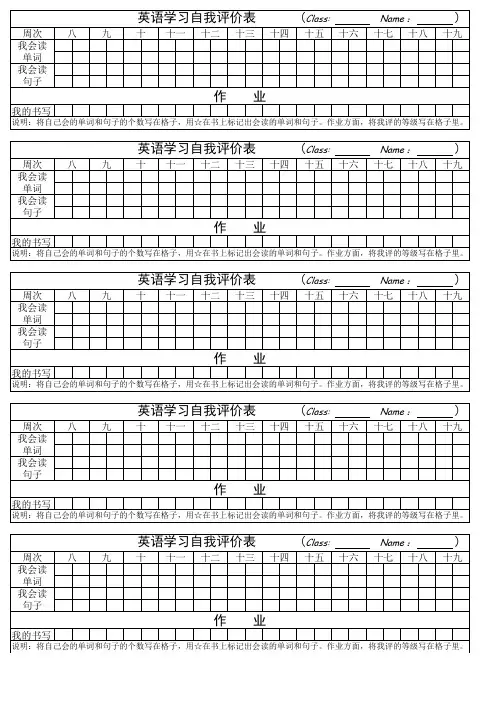
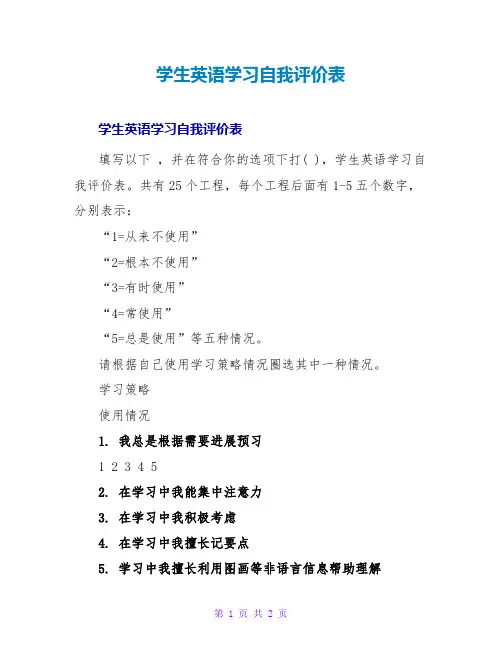
学生英语学习自我评价表
学生英语学习自我评价表
填写以下,并在符合你的选项下打( ),学生英语学习自我评价表。
共有25个工程,每个工程后面有1-5五个数字,分别表示:
“1=从来不使用”
“2=根本不使用”
“3=有时使用”
“4=常使用”
“5=总是使用”等五种情况。
请根据自己使用学习策略情况圈选其中一种情况。
学习策略
使用情况
1. 我总是根据需要进展预习
1 2 3 4 5
2. 在学习中我能集中注意力
3. 在学习中我积极考虑
4. 在学习中我擅长记要点
5. 学习中我擅长利用图画等非语言信息帮助理解
6. 我通常借助联想学习和记忆词语
7. 我对所学内容主动复习并加以整理和归纳
8. 我注意发现语言的'规律并运用规律举一反三
9. 使用英语时我能意识到错误并适当纠正
10. 必要时我借助汉语知识理解英语
11. 我经常阅读英语故事及其他英语课外读物
12. 我借助联想把相关知识联络起来
13. 我经常利用推理、归纳等手段分析^p 和解决问题
14. 我有明确的英语学习目的
15. 我经常制定英语学习方案
16. 我积极探究合适自己的英语学习方法
17. 我经常与教师和同学交流学习体会
18. 我尽量通过多种渠道学习英语
19. 我对英语和英语学习有积极的态度
20. 我逐步树立学习英语的信心
21. 在交际中,我经常借助手势、表情等进展表达
22. 在交际中我注意中外交际风俗的差异
23. 在交际中,我能克制语言障碍,维持交际
24. 我注意通过音像资料丰富自己的学习
25. 我经常使用工具书查找信息。
初中英语学生自我评价表Here is an essay on the topic of "Self-Evaluation Form for Middle School English Students" with more than 1000 words, written in English without any extra punctuation marks in the body of the text.Learning a new language can be a challenging yet rewarding experience for any student. As a middle school English student, it is important to regularly assess one's progress and identify areas for improvement. A self-evaluation form can be a valuable tool in this process, allowing students to reflect on their strengths, weaknesses, and overall language proficiency.One of the key components of the self-evaluation form is the assessment of listening comprehension skills. Being able to understand spoken English is crucial for effective communication and academic success. Students should evaluate their ability to follow instructions, comprehend conversations on familiar topics, and identify key information in audio recordings. This can be done by reflecting on classroom experiences, as well as any exposure to English-language media, such as movies, TV shows, or podcasts.Another important aspect is the evaluation of speaking skills.Students should consider their confidence in expressing themselves in English, their ability to engage in basic conversations, and their pronunciation accuracy. This can be assessed through role-play activities, presentations, or even informal conversations with the teacher or classmates. It is important for students to identify any areas of difficulty, such as grammar usage, vocabulary limitations, or hesitancy in speech, and to develop strategies to improve these skills.Reading comprehension is also a crucial component of language learning. The self-evaluation form should prompt students to assess their ability to understand written texts, such as short stories, articles, or textbook passages. This can involve evaluating their skills in identifying main ideas, understanding vocabulary in context, and drawing inferences from the text. Students should also consider their reading speed and fluency, as well as their ability to apply reading strategies, such as skimming, scanning, or close reading.Writing skills are another essential aspect of language proficiency. The self-evaluation form should encourage students to reflect on their ability to express themselves in written English, including their mastery of grammar, sentence structure, and vocabulary. Students should also consider their skills in organizing their thoughts, developing coherent paragraphs, and effectively communicating their ideas. Additionally, they should evaluate their ability to revise and edit their work, as this is a crucial step in the writing process.In addition to the core language skills, the self-evaluation form should also address students' understanding of cultural aspects related to the English-speaking world. This can include their knowledge of cultural customs, traditions, and social norms, as well as their ability to navigate cross-cultural situations and communicate effectively with people from diverse backgrounds.Another important component of the self-evaluation form is the assessment of learning strategies and study habits. Students should reflect on their ability to set achievable goals, manage their time effectively, and utilize various learning resources, such as dictionaries, grammar guides, or online tools. This can help them identify areas where they need to improve their study skills and develop more effective learning strategies.Finally, the self-evaluation form should encourage students to set personal goals and action plans for improvement. By identifying their strengths and weaknesses, students can develop a clear understanding of their current language proficiency and create a roadmap for future growth. This can involve setting specific, measurable, and attainable goals, as well as outlining the steps they will take to achieve these goals, such as seeking additional practice opportunities, attending tutoring sessions, or engaging in self-directed learning activities.In conclusion, the self-evaluation form for middle school English students is a valuable tool that can help students take an active role in their language learning journey. By regularly assessing their progress, identifying areas for improvement, and setting personalized goals, students can develop a deeper understanding of their language skills and take ownership of their learning process. This, in turn, can lead to greater academic success, improved communication abilities, and a stronger foundation for future language learning.。
学生英语能力自评/互评表
(摘自教育部高等教育司,2007,《大学英语课程教学要求》)
使用说明
1.《学生英语能力自评/互评表》细化和列举了一般要求、较高要求和更高要求中的各项语
言技能,可以帮助教师更好地理解不同层次的教学要求,在教学中增强针对性。教师还可以
根据本校的大学英语教学大纲,补充或调整有关的微技能。
2.在教学开始时,教师向学生介绍自评/互评表中各项微技能,帮助学生了解教学要求。
3.教师定期要求学生进行自评和互评,通过评估,帮助学生了解自己对语言微技能的掌握
情况,及时调整学习行为。
4.学生在自评/互评表右面的“评价”栏中对自己或同学的英语能力做出评估,能够做到的
打钩()。根据自评或互评的结果,参考下表中的提示,对下一阶段的学习作出相应安排。
优 良 中 差
能掌握各项语言技能中所有的微技能;完全达到本层次的教学要求。 能掌握各项语言技能中3/4左右的微技能;较好地达到本层次的教学要求,稍加努力,可望实现学习目标。 能掌握各项语言技能中2/3左右的微技能;基本达到本层次的教学要求,但仍应继续努力。 未能掌握各项语言
技能中1/2的微技
能;未达到本层次
的教学要求,应寻
求指导,调整学习
方法和计划。
自评和互评结果记录可以参考下表:
日期 (年/月/日) 评估方式() 评估结果(优、良、中、差)
自评 互评 听 说 读 写 译
表1:一般要求
评价
阅读/Reading
我能以中等速度(每分钟70词)基本读懂语言难度中等、一般性题材的文章,
理解其大意及主要细节。
我能以较快速度(每分钟100词)阅读篇幅较长、语言难度略低的文章。
我能借助词典阅读本专业的英语教材和题材熟悉的英文报刊的文章,掌握中心
大意,理解主要事实和有关细节。
我能读懂生活中常见表格如注册表、申请表、问卷调查表等。
我能读懂指示语、产品说明书、广告、海报、邀请函等。
我能读懂涉及日常生活的个人信件或内容一般的商业信函。
我能浏览互联网上的一般信息,基本读懂国内英文报刊,理解大意及主要事实。
我掌握了基本的阅读技能,如根据上下文猜测生词或习语的意思、寻读、略读
等。
写作/Writing
我能填写常见表格如注册表、申请表、问卷调查表等。
我能写给或回复他人祝贺卡、生日卡、邀请信、便条、短信、通知等。
我能写出简单的指示语、个人广告、社团海报、个人简历等。
我能简要地描述个人经历、发生的事件、读过的故事、观看的影片、喜怒哀乐
等情感,写出或回答个人或公司的信函、电子邮件、传真等。
我能就一定话题或提纲在30分钟内写出不少于120词的短文,内容基本完整、
中心思想明确、用词恰当、语意连贯。
我能在一般写作或应用文写作中恰当使用相应的写作技能。
表2:较高要求 评价
阅读/Reading
我能以中等速度(每分钟70-90词)基本读懂英语国家大众性报刊杂志上一般性题材的文章。
我能以较快速度(每分钟120词)阅读篇幅较长、难度适中的文章。
我能略读新闻、人物、事件等报导的主要内容,抓住其要点,能寻读有关材料,快速查找所需信息。
我能阅读所学专业的综述性文献,并能正确理解中心大意,抓住主要事实和有关细节。
我能借助词典读懂与我专业相关的技术性论文,能从技术性手册中快速查找所需信息以解决遇到的技术问题。
写作/Writing
我能就所读一般主题的文章写出其摘要或大纲,能阐述自己对某一焦点问题的观点,并能基本陈述赞成或反对的理由。
我能写所学专业论文的英文摘要。
我能写出日常的应用文章,结构与表达符合应用文体规范。
我能借助参考资料写出专业小论文,结构基本清晰。
我能就一般性主题在半小时内写出不少于160词的记叙文、说明文或议论文,
内容完整,观点明确、条理清楚、文理通顺。
表3:更高要求 评
价
阅读/Reading
我能读懂有一定难度的文章,理解其主旨大意及细节。
我能借助词典读懂原版英语教材和英语国家报刊杂志上的文章。
我能较为顺利地阅读所学专业的英语文献和资料。
写作/Writing
我能就一般性主题比较自如地表达个人的观点,做到文章结构清晰、内容丰富、逻辑性强。
我能将从不同渠道获取的信息进行归纳、总结,写成英文概要或汇报提纲。
我能撰写专业文章摘要,能写简短的专业报告和论文。
我能就一般性主题在半小时内写出不少于200词的记叙文、说明文或议论文,思想表达清楚、文章结构清晰、内容丰富、逻辑性强。